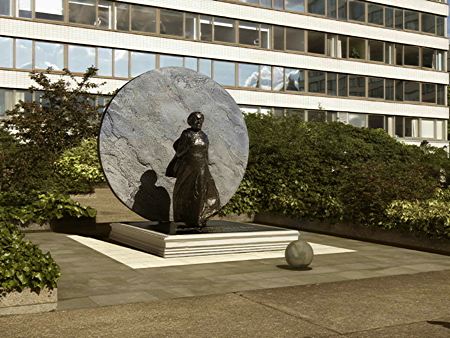Mary Seacole statue at St Thomas' Hospital approved by councillors
Plans for a statue of Mary Seacole to be erected in the grounds of St Thomas' Hospital have been approved Lambeth Council despite opposition from leading medical and nursing figures.

Jamaican-born Seacole, who tended the sick of the Crimea War, is to be honoured with a floodlit statue in the St Thomas' Hospital garden alongside Westminster Bridge.
The sculpture has been designed by Martin Jennings who created the John Betjeman statue at St Pancras International.
Opposition to the choice of location for the statue came from both medical historians concerned that the prominent memorial would overshadow the hospital's connections with nursing pioneer Florence Nightingale and those worried about the impact of the artwork on the tranquility and greenery of the existing garden..
Lambeth's planning applications committee, meeting at the town hall on Tuesday evening, heard the views of former president of the Royal College of Surgeons Sir Barry Jackson and president of the Royal College of Physicians Sir Richard Thompson.
Sir Barry, who had intended to be present, said in letter that the statue was too large and would dominate the garden. He added: "Mary Seacole has no association whatsoever with St Thomas' Hospital and it would therefore wrongly suggest to the public being educated that Mary Seacole had an important position within St Thomas'".
Former hospital governor Dr John Mathews, who quoted from the letter, said that Sir Barry was both president of the hospital Friends and a member of the Crimea War War Record Committee.
Sir Richard Thomson, who was quoted as saying that the statue would interfere with the garden's peace and tranquility, had suggested that the better location was the nearby Forum Magnum Square opposite the historic General Lying-In Hospital building.
Wendy Mathews, a St Thomas' historian who lectures on Florence Nightingale, spoke in favour of Sir Richard's alternative site. She added: "We are not opposed to the statue; we are opposed to the site." She felt that it was a misrepresentation to associate Seacole with St Thomas' and a mistake to make changes to a valued garden.
Michael Ball, Waterloo Community Development Group director, spoke strongly in favour of a Mary Seacole statue but claimed that the proposed sculpture was too large and would "diminish" the garden. He compared its size with Admiral Nelson in Trafalgar Square, designed to be seen from a distance, Churchill in Trafalgar Square and Nelson Mandela on the South Bank.
Lord Soley, chairman of the Mary Seacole Memorial Statue Appeal, said that Florence Nightingale and Mary Seacole were "complementary" and not "contradictory". If the plan received the go-ahead Mary Seacole would be the first black woman with a named memorial in the United Kingdom.
Lord Soley was supported by Royal British Society of Sculptors past president Philomena Davidson.
Five councillors voted in favour of the application with just one other abstaining.
"I am delighted the planning committee has supported this," said Lord Soley as he left the town hall after the thirty minute hearing. "I think it will be a very real plus both to the hospital and the South Bank. I think people will be proud of this."
Wendy Mathews said: "We are not surprised but we are disappointed."
Also present for the planning applications committee was Dr Lynn McDonald of the University of Guelph in Canada who argued that Florence Nightingale was the pioneer nurse at St Thomas'.
"The decision tonight was made on purely technical grounds and we were not allowed to raise any of the issues of the merits and demerits," she said.
Dr McDonald is giving a lecture on Nightingale and Seacole next month at the Florence Nightingale Museum.
A 'Mary Seacole information website' has been set up which counters alleged misrepresentations of the respective records of Seacole and Nightingale.
Comments
Share
The SE1 website is supported by people like you
More to read
- Bermondsey pupil wins Mary Seacole competition 24 Feb 2020
- South Bank Sculpture Walk: new guide to public art by the river 10 Dec 2017
- Memorial to healthcare workers in war and disaster zones unveiled 8 Dec 2017
- A Statue for Mary: new book tells story of Seacole memorial 11 Dec 2016
- Mary Seacole statue unveiled at St Thomas' Hospital 30 Jun 2016
- Date set for unveiling of Mary Seacole statue at St Thomas' 18 May 2016
- Chancellor pledges £240k for Mary Seacole statue at St Thomas' 25 Nov 2015
- Mary Seacole statue delayed by 'unexpected costs' 5 Sep 2015
- Preparations begin for Mary Seacole statue at St Thomas' Hospital 4 May 2015
- Dedication ceremony held at future site of Mary Seacole statue 9 Jul 2014
Follow us
Email newsletter
For the latest local news and events direct to your inbox every Monday, you need our weekly email newsletter SE1 Direct.

